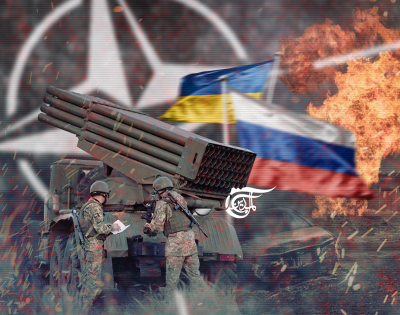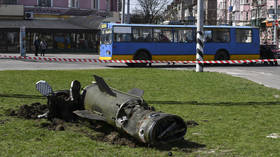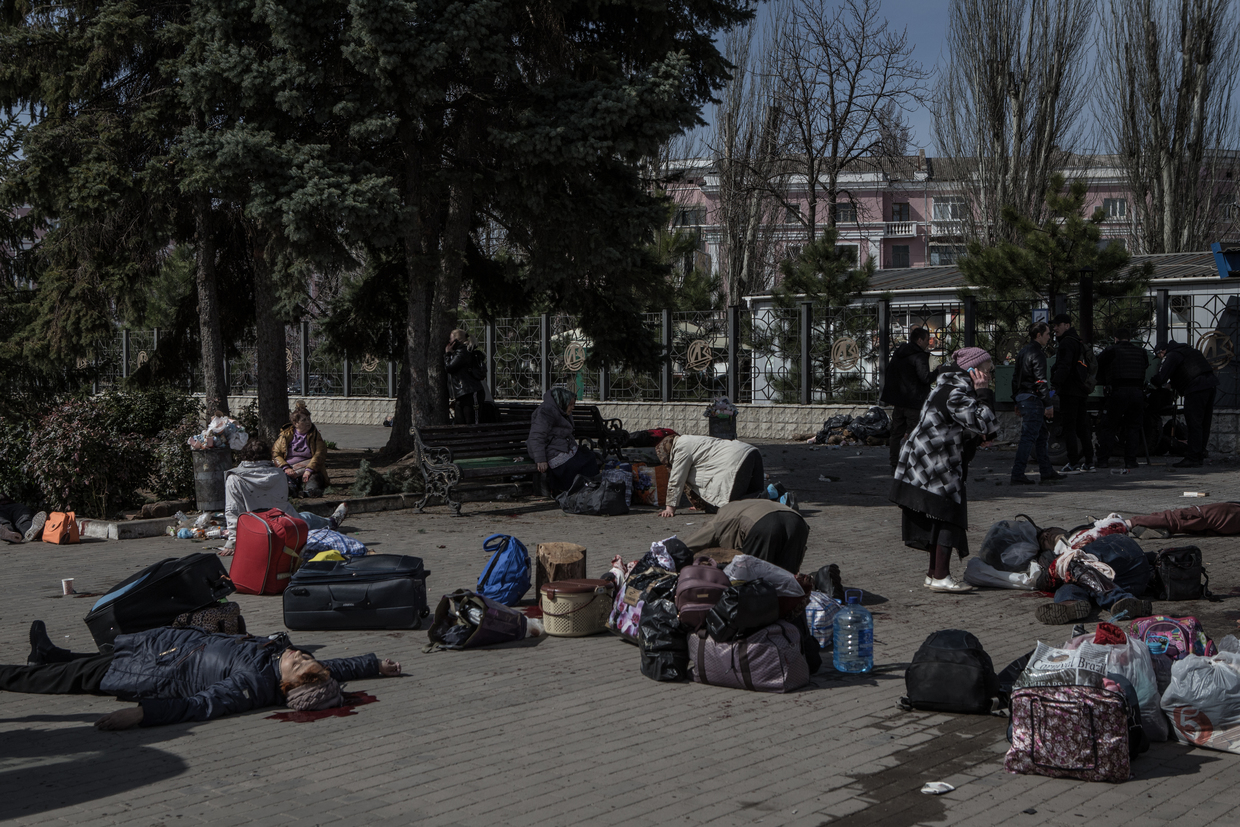De oorlog in Oekraïne kan niet los gezien worden van de ernstige crisis waarin het neoliberale kapitalisme zich bevindt. Sterker nog, het is juist een manifestatie van wat een ‘systemic crisis’ heet, een crisis van het hele systeem, die zich openbaart op het gebied van onder andere grondstoffen-tekorten, opkomende grootmachten, concurrentie op markten waarover voorheen een westers monopolie heerste, de bevolkingsexplosie in de arme wereld, global warming, milieuvernietiging, almaar afnemende geloofwaardigheid van de westerse politiek en de pers, het onvermijdelijke gewelddadig verzet tegen de rijkste 1 procent van de wereldbevolking die de helft bezit van alle rijkdommen, terwijl 12.2 van de wereldbevolking 84.9 procent alle rijkdom op aarde bezit. Daarnaast is de afgelopen vier decennia tenminste eenderde van alle landbouwgrond verloren gegaan door ‘human-caused’ erosie en milieu-verontreiniging. Ondertussen blijft een kleine elite van het zwaarst bewapende land in de geschiedenis van de mensheid, de Verenigde Staten, oorlogen uitlokken of oorlogen voeren, daarbij blind gesteund door een even misdadige Europese elite. Kortom, het voortbestaan van de mensheid wordt bedreigd door een diep ingrijpende crisis van de koloniale orde die vijf eeuwen geleden begon toen Columbus voor het eerst de ‘Nieuwe Wereld’ betrad en in zijn logboek over de ‘Indianen’ schreef dat zij:
brought us parrots and balls of cotton and spears and many other things, which they exchanged for the glass beads and hawks’ bells. They willingly traded everything they owned. . . They were well-built, with good bodies and handsome features. . . They do not bear arms, and do not know them, for I showed them a sword, they took it by the edge and cut themselves out of ignorance. They have no iron. Their spears are made of cane. . . They would make fine servants. . . With fifty men we could subjugate them all and make them do whatever we want,
waaraan hij naderhand toevoegde:
As soon as I arrived in the Indies, on the first Island which I found, I took some of the natives by force in order that they might learn and might give me information of whatever there is in these parts.
In zijn bestseller A People's History of the United States (2003) beschreef de Amerikaanse historicus Howard Zinn wat Columbus vooral wilde weten:
Where is the gold? He had persuaded the king and queen of Spain to finance an expedition to the lands, the wealth, he expected would be on The information that Columbus wanted most was: Where is the gold? He had persuaded the king and queen of Spain to finance an expedition to the lands, the wealth, he expected would be on the other side of the Atlantic — the Indies and Asia, gold and spices…
In return for bringing back gold and spices, they promised Columbus 10 percent of the profits, governorship over new-found lands, and the fame that would go with a new title: Admiral of the Ocean Sea.
En zo kon een eenvoudige ‘merchant’s clerk from the Italian city of Genoa, part-time weaver (the son of a skilled weaver), and expert sailor,’ de aanzet geven tot de meest genocidale rooftocht in de geschiedenis. Maar het plunderen loopt nu ten einde. De Amerikaanse auteur Barry Lopez wees in zijn boek The Rediscovery of North America (1990) met betrekking tot de massale ontworteling en vervreemding die deze rooftocht met zich meebracht, dat een:
sense of place must include, at the very least, knowledge of what is inviolate (ongeschonden. svh) about the relationship between a people and the place they occupy, and certainly, too, how the destruction of this relationship, or the failure to attend to it, wounds people. Living in North America and trying to develop a philosophy of place — a recognition of the spiritual and psychological dimensions of geography — inevitably brings us back to our beginnings here, to the Spanish inversion (omwenteling. svh). The Spanish experience was to amass wealth and go home. Those of us who have stayed, who delight in the litanies of this landscape and who can imagine no deeper pleasure than the fullness of our residency here, look with horror on the survival of that imperial framework in North America — the physical destruction of a local landscape to increase the wealth of people who don't live there, or to supply materials to buyers in distant places who will never know the destruction that process leaves behind.
Op zijn beurt concludeerde de Australische paleontoloog Tim Flannery in Een ecologische geschiedenis van Noord-Amerika (2001):
De kern van de pionierservaring schuilt in de enorme rijkdommen en als die rijkdommen onbegrensd zijn, waarom zou je daar dan zuinig mee omspringen of ze zelfs maar efficient benutten. Het doel is de bestaansbronnen zo snel mogelijk te exploiteren en vervolgens verder te trekken. Het is deze pioniershouding ten aanzien van de benutting van bestaansbronnen die ten grondslag ligt aan het kapitalisme en waar hedendaagse natuurbeschermers het zo moeilijk mee hebben. In deze zin is de erfenis van de Amerikaanse pionier nog altijd onder ons.
Flannery benadrukt dat het Amerikaans radicalisme een systeem is van roofbouw dat alles wat in de weg staat elimineert. En zo hadden in:
de jaren vijftig van de vorige eeuw de Noord-Amerikanen ongeveer viervijfde van de dierenwereld van het continent uitgemoord, meer dan de helft van de bomen gekapt, de inheemse culturen vrijwel volledig vernietigd, de meeste rivieren afgedamd, de productieve zoetwatervisserij verwoest en een groot deel van de bodem uitgeput. Ze hadden een grote overwinning in de oorlog behaald en één van de welvarendste en zelfgenoegzaamste maatschappijen aller tijden gecreëerd, en nog was de plundering van de de natuurlijke bestaansbronnen niet afgelopen. In 1999 stonden twaalfhonderd inheemse Noord-Amerikaanse soorten op de officiële lijst van bedreigde diersoorten en dat is een zware onderschatting, want betrouwbare schattingen gaan ervan uit dat ongeveer zestienduizend soorten ernstig in hun voortbestaan bedreigd worden.
Maar die:
superioriteit heeft wel een prijskaartje gehad, want het kostte het continent een groot deel van zijn natuurlijke rijkdommen en zijn ecologische stabiliteit. Zelfs nu nog offert het agressieve kapitalisme rivieren, bodem en de armere volkeren van Noord-Amerika op het altaar van de god van fortuin, net zoals de Azteken 500 jaar geleden met hun slachtoffers deden.
Over de eerste generaties puriteinse kolonisten meldde Flannery:
In Europa waren ze uitschot, vervolgd en beschimpt als religieuze fanatici. Hier waren ze meester over hun eigen toekomst en tevens de potentiële heersers over een nieuw land…
De wreedheid van hun regelgeving was in zekere zin een respons op hun nieuwe thuis. Zij geloofden namelijk dat Amerika een bolwerk van de duivel was. Alles in dit land leek van God verlaten, van de Indianen die zij aanzagen voor duivels-aanbidders, tot de woeste landschappen en wilde dieren.
In de kapitalistische ideologie, die nut en efficiency tot de hoogste waarden heeft verheven om zoveel mogelijk winst te kunnen maken, spreekt niets meer in zijn eigen taal met ons. Alles wordt gereduceerd tot een zielloos object dat of bruikbaar is en daarom nuttig, of onbruikbaar, dus verwaarloosbaar. Wat geen nut heeft, kan als onkruid worden vernietigd. in zijn boek Lost Mountain: A Year in the Vanishing Wilderness. Radical Strip Mining and the Devastation of Appalachia (2007) maakte de Amerikaanse auteur Eric Reece zijn lezers erop attent dat:
[w]e are currently witnessing — and ignoring — the sixth great extinction since the advent of life on earth. This is not a hysterical cry of some druid; it is cold scientific fact.
In het voorwoord van Lost Mountain verklaart de prominente Amerikaanse cultuurcriticus en dichter professor Wendell Berry over de neoliberale ideologie:
every one of our economic landscapes have been put at the mercy of a class of economic aggressors whose aim is to convert the natural world into money as quickly as is technologically possible and at the least possible cost. If that least cost is the total destruction of the land and the land's communities, that is understood as an acceptable cost of doing business.
Heeft deze vernielzucht de consument gelukkiger gemaakt? Nee, niet echt, want:
while Americans are four times more affluent than during the 1960s, we have shown no measurable gains in happiness. In fact the opposite is true: We are more depressed, more medicated, more frazzled than at any other time in our short history,
aldus Reece, die vervolgens verwijst naar de Britse auteur Henry Salt, ‘one of the first thinkers to extend the realm of ethics beyond the realm of the human.’ In zijn boek The Creed of Kinship (1935) stelde Salt dat de ‘basis of any real morality must be the sense of kinship between all living beings.’ In de zeventiende eeuw verwoordde de van origine joodse filosoof Spinoza deze houding als volgt:
We beschikken niet over de absolute macht om dingen buiten ons aan te passen aan onze behoeften. Niettemin moeten we kalm de dingen ondergaan die ons overkomen en die ingaan tegen ons voordeel; als we ons ervan bewust zijn dat we onze plicht hebben gedaan en dat de macht waarover wij beschikken niet zover gaat dat wij die dingen hadden kunnen vermijden, en dat we een deel zijn van de Natuur, aan wier ordening wij zijn onderworpen.
Wat Salt en Spinoza beschreven vormt al millennia-lang de essentie van alle grote levensbeschouwingen, zij demonstreert een diep respect voor het mysterie van het leven. Alles is met alles verbonden en ‘Whatever befalls the earth befalls the sons of the earth,’ de mens is slechts een draad in het ragfijne web van myriade bestaansvormen, en ‘whatever he does to the web, he does to himself.’ Vanuit dit inzicht waarschuwde de grote Chief Seattle de witte Europese veroveraar met de woorden: ‘Continue to contaminate your own bed, and you will one night suffocate in your own waste.’ Al deze wijsheid is verloren gegaan in de onverzadigbare cultuur van roofbouw. Lopez gaat dieper in op dit fenomeen door uiteen te zetten dat in:
Spanish, la querencia refers to a place on the ground where one feels secure, a place from which one’s strength of character is drawn… a place in which we know exactly who we are. The place from which we speak our deepest beliefs…
I would like to take this word querencia beyond its ordinary meaning and suggest that it applies to our challenge in the modern world, that our search for a querencia is both a response to threat and a desire to find out who we are. And the discovery of a querencia, I believe, hinges on the perfection of a sense of place.

where is the man or woman, standing before lifeless porpoises (bruinvissen. svh) strangled and bloated (gezwollen. svh) in a beach cast driftnet, or standing on farmland ankle deep in soil gone to flour dust, or flying over the Cascade Mountains and seeing the clearcuts stretching for forty miles, the sunbaked earth, the streams running with mud, who does not want to say, ‘Forgive me, thou bleeding earth, that I am meek and gentle with these butchers?’
Nu ‘the Music is Over’ resteert ons alleen nog de vraag van Jim Morrison:
What have they done to the earth?
What have they done to our fair sister?
Ravaged and plundered
and ripped her and bit her
Stuck her with knives
in the side of the dawn
and tied her with fences
and dragged her down.
Maar zelfs wanneer de consument aan ‘our fair sister’ vergiffenis zou vragen voor zijn misdaden dan nog weet hij dat de elite doofstom zal blijven, de macht is niet democratisch. Wat ‘we really face,’ zo merkt Lopez op:
is something much larger, something that goes back to Guanahaní ((San Salvador, waar Columbus voor het eerst voet aan wal zette op het Amerikaanse continent. svh) and what Columbus decided to do, that series of acts — theft, rape, and murder — of which the environmental crisis is symptomatic. What we face is a crisis of culture, a crisis of character. Five hundred years after the Niña, the Pinta, and the Santa Maria sailed into the Bahamas, we are asking ourselves what has been the price of the assumptions those ships carried, particularly about the primacy of material wealth. One of our deepest frustrations as a culture, I think, must be that we have made so extreme an investment in mining the continent, created such an infrastructure of nearly endless jobs predicated on the removal and distribution of trees, water, minerals, fish, plants, and oil, that we cannot imagine stopping. In the part of the country where I live, thousands of men are now asking themselves what jobs they will have — for they can see the handwriting on the wall — when they are told they cannot cut down the last few trees and that what little replanting they've done — if it actually works — will not produce enough timber soon enough to ensure their jobs.
Maar de vraag ‘wat de prijs is geweest van’ al die onverzadigbare driften, met bovenal de verheerlijking van het ‘primaat van materiële rijkdom’ wordt vermeden. Net als de vraag waarom de ‘deep state’ van de White Anglo-Saxon Protestants sinds begin van de 21ste eeuw juist neoconservatieve joodse Amerikanen en een kongsi van rijke joodse Oekraïeners in een traditioneel antisemitisch land gebruiken om een regime-change in Rusland te forceren? Daarover de volgende keer.














